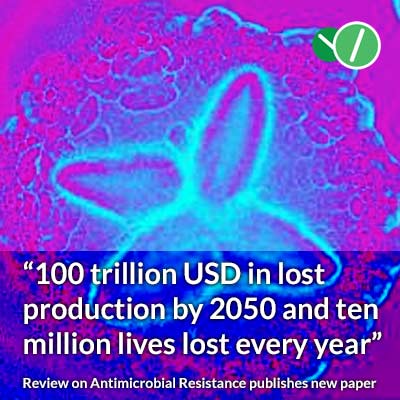The Review has today set out its initial reccomendations in the paper Tackling a global health crisis: Initial steps. We use this paper to set out our assessment of the international AMR research funding landscape, and make our first recommendations for global action to address the challenges of rising drug resistance. This includes the establishment of a global AMR Innovation Fund; steps to help maintain the effectiveness of existing antibiotics; and action to address an emerging skills shortage in this crucial field of research.
The next steps During the coming months we will continue work on all the themes we have outlined. In the meantime, we would like this paper to catalyse action to support five initial steps that can already be taken to tackle AMR. We look forward to working with senior decision makers in governments, philanthropic agencies and industry who need to address the details of how to tackle the problem of AMR across its many facets. In the coming months we will be travelling to India and China to discuss antimicrobial resistance with policy makers and companies, to discuss their views on the most promising solutions. The efforts to bring forward innovations in areas such as new therapies, diagnostic devices and surveillance techniques need to be international. With the right kind of cooperation between countries a lot can be done to upgrade and link up existing infrastructure, and help countries embrace new technology wherever feasible. This is why we think that the fight against antimicrobial resistance must be placed high on the G-20’s agenda. A solution to antimicrobial resistance need not be expensive. It is likely to cost the world much less than 0.1% of global GDP. Weighed against the alternative – 100 trillion USD in lost production by 2050 and ten million lives lost every year – it is clearly one of the wisest investments we could make.
“Drug-resistant infections already kill hundreds of thousands a year globally, and by 2050 that figure could be more than 10 million. The economic cost will also be significant, with the world economy being hit by up to $100 trillion by 2050 if we do not take action.”Jim O’Neill, Chairman of the Review on AMR, said:
“Wise policy looks ahead and tries to manage risks, particularly the big ones. There can be no doubt now that antimicrobial resistance is one of the biggest that we, all of us, face. The work of the group led by Jim O’Neill is of profound importance and this paper shows very convincingly the great scale of the risks, in terms of human lives and the economy, that are posed by this deeply worrying phenomenon.”Reacting to this report, Nick Stern, President of the British Academy, IG Patel Professor of Economics and Government at the LSE and former Chief Economist of the World Bank, said:


You must log in to post a comment.